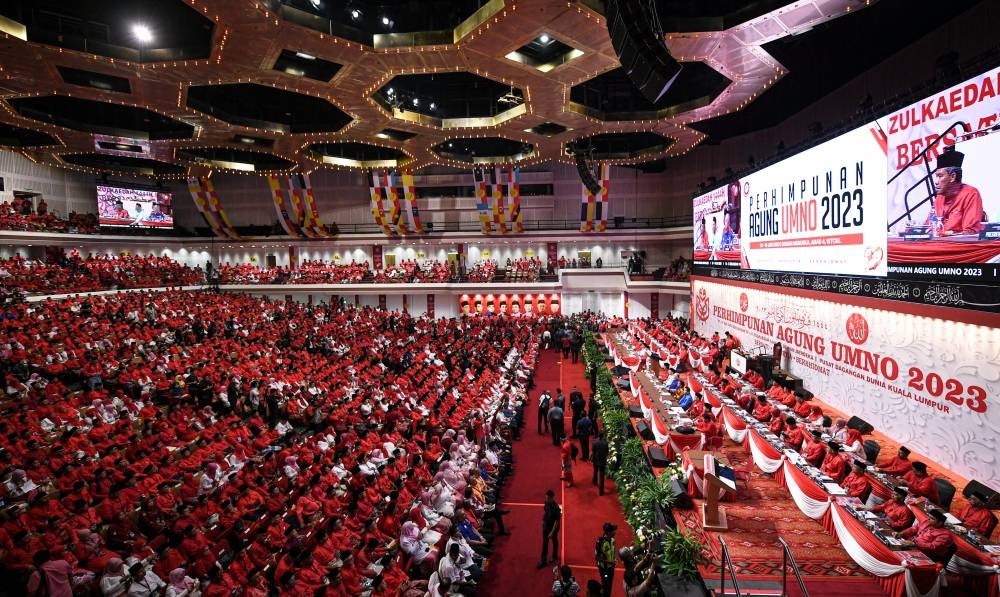A mature-front by Umno’s top leadership this time around at PAU2023

LAST week, Umno’s annual general assembly started with a few hiccups and bumps along the way, especially by the youth wing in relation to Umno’s current cooperation with the DAP within the unity government.
While this assembly could have been used as a platform to showcase the party’s renewed commitment towards reform and for stability of the country, it instead showcased internal cracks on the first few days.
This is unfortunate considering the so-called unity government convention which took place in the same building a month prior.
Initially, the cracks appeared to be generational with the youth being more ideological, perhaps arguably because they have less to lose in Malaysia’s new multi-party system.
Of course, it is not wrong to be ideological. In fact, one can even make the argument that political parties in Malaysia suffer from being too personality-centered rather than ideologically-driven or policy-based.
Nevertheless, when a party’s ideology and strategy has shown to be its Achilles’ heel, holding on to such strict stances may lead to confusion regarding the priorities of the party and the way forward.
Since 2008, votes and seats won by Umno have been declining. From 109 seats in 2004, Umno’s seats went down to 79 (2008), went slightly up to 88 (2013), and down again to 54 (2018), and finally 26 (2022).
On the other hand, votes and seats for the DAP have increased despite gerry-mandering and malapportionment from 12 in 2004 to 28 (2008), 38 (2013), 42 (2018) and went down slightly to 40 in 2022, which is still more than Umno’s.
The message should have been received loud and clear that Umno needs to change for it to win back the people’s trust. The central leadership seems to understand this even if the change of direction in partnering up with Pakatan Harapan (PH) is confusing to the grassroot.
This is where I think the youth wing comes into the picture.
Recognising that they cannot depend on the central leadership to hold on to the narrative of Umno protecting the special rights and positions of the Malays from supposed violation by the so-called secularists, the youth wing has taken it upon themselves to keep the narrative alive.
In other words, they’re keeping Umno’s ideological commitment to the Malay cause.
There is no denying that the DAP and her allies had in the past been critical of Umno. But what seems to be forgotten is that it was not a one-sided affair.
Umno had also called the DAP, PKR, and Amanah many unsavoury things.
However, more mind-boggling than the call for DAP to apologise is the continued call for the release of the person who has been cited as the cause of voters’ shift towards the so-called “clean” Perikatan Nasional.
As has been widely reported and documented, Umno’s fall from grace when it lost its first ever general election since independence in 2018 was partly a result of the people’s protest vote against the Datuk Seri Najib Razak administration and the 1Malaysia Development Bhd (1MDB) scandal.
A mere four years later, the party received less than a fifth of the vote by the people when it once was the dominant party in control of two-thirds of seats in parliament.
While the “Bossku” phenomenon partly accounted for the the success of Barisan Nasional in the Johor and Melaka state elections, it should be a moot point after the judiciary upheld the former prime minister’s conviction on money laundering charges. Nonetheless, Umno knows that it is the kingmaker, and the unity government depends on the support of its members of parliament.
This allowed them space to make such requests.
This is the conundrum of a multiparty democracy. It is definitely more uncertain with post-election coalitions as opposed to the pre-election coalitions we are used to.
But the alternative to the current situation would be a hegemonic party that rules for decades with little oversight.
As the nation continues to move towards democracy, we should learn to accept compromises in the search for a middle ground.
Political campaigning is about annihilating the opponent in order to garner votes away from other parties, but running a government is about building each other up for the sake of the nation.
Umno’s top leadership must show that it is willing to listen to dissenting voices, not just from other parties, but also within its own party.
The fact that the youth wing had the courage to voice opposing opinions shows they are not fearful of the president.
This is of course a simplistic analysis as the party is very much still under the current president’s thumb.
But the fact that the president was willing to listen to the grassroot and their wish for the readmission of suspended or sacked members shows there is hope in revitalising Umno from becoming obsolete in Malay(sian) politics.
Syaza Shukri, PhD is an assistant professor of political science at International Islamic University Malaysia.
The views expressed in this article are the author's own and do not necessarily reflect those of Sinar Daily
Download Sinar Daily application.Click Here!















